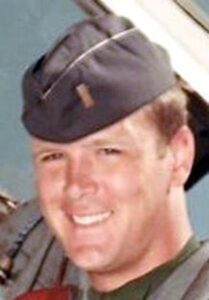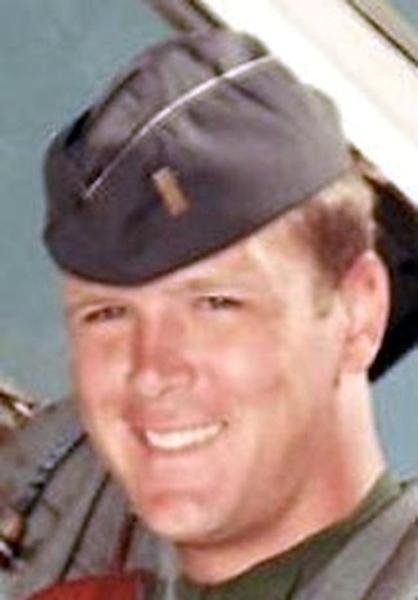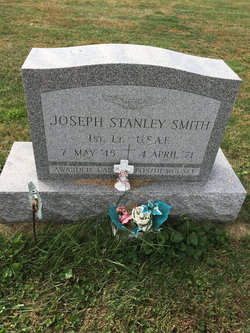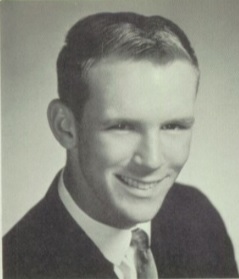According to the Defense POW/MIA Accounting Agency, “on April 4, 1971, then 1Lt Smith was the pilot of a single-seat F-100D (#563120) aircraft as the leader in a flight of two aircraft on a combat mission over Cambodia [Kampong Thum Province]. While making a pass over the target, the pilot of the other aircraft noted white vapor streaming from the left wing of Smith’s aircraft. It crashed a half-mile from the target.
The other pilot reported that he did not see any ejection from Smith’s aircraft and no beepers were heard. The following day, an aerial search revealed aircraft wreckage over a large area, but no remains were observed. Due to intense enemy activity in the area, ground forces could not attempt a recovery, and Smith was declared missing in action.”
Joseph Stanley Smith was born in Assumption, Illinois on May 7, 1945. He had been assigned to the 612th TFS out of Phu Cat. Joe had been married for just less than a year to his wife, Elaine.
U.S. and Kingdom of Cambodia teams, with the assistance of the U.S. Embassy’s POW/MIA specialists, investigated the loss from 1996 until 2016. His remains were still with the wreckage of his F-100 and were positively identified using DNA and laboratory analysis in May 2017.
In August 2017, more than 46 years after he was shot down, Capt. Joseph S. Smith was laid to rest in St. Mary Cemetery in Assumption, IL.
Joseph is honored on the Vietnam Veteran’s Memorial in Washington DC. Name inscribed at VVM Wall, Panel 04w, Line 106.
(1) Source: https://www.thecompassnews.org/2017/08/air-force-pilot-shot-cambodia-mia-46-years-laid-rest/; Photos/Bio info – HonorStates.org; Add’l photos – Herald&Review
From Issue 35 of The Intake by Medley Gatewood and Dave Young.
Current Events — Joe Smith Comes Home
 Pertinent Facts: F-100 pilot Joe Smith went MIA in Cambodia on 4 APR ’71. Forty-six years later, his remains found their way back to his hometown, a small village in Illinois. The whole town, and a lot of other folks, turned out for his homecoming. This report on that is by two pilots who knew him well: Dewey Clawson, who flew with him at Phan Rang, and Dave Young, who was a UPT classmate of Joe’s. Good job, guys.
Pertinent Facts: F-100 pilot Joe Smith went MIA in Cambodia on 4 APR ’71. Forty-six years later, his remains found their way back to his hometown, a small village in Illinois. The whole town, and a lot of other folks, turned out for his homecoming. This report on that is by two pilots who knew him well: Dewey Clawson, who flew with him at Phan Rang, and Dave Young, who was a UPT classmate of Joe’s. Good job, guys.
At first glance, there’s not much to Assumption, Illinois, population 1,168. Surrounded by acres of cornfields and soybeans, the most notable architecture is the hundred-foot-high grain elevators. But when we entered the town on Monday, July 17,, 2017, those towering elevators didn’t even catch our eye. What captured our attention—and our hearts—were the American flags lining the highway—hundreds of them, gently flowing in the Midwest breeze. Assumption was welcoming home one of their own: Joe (aka “Smitty”) Smith. On the previous Saturday, July 15th, hundreds of well-wishers, fire and emergency vehicles from all over Central Illinois, hundreds of motorcycles, and an eight-mile stretch of highway lined with American flags, awaited the fallen pilot who was finally returning to his home.
On April 4th, 1971, Smitty was shot down in Cambodia flying an F-100. He was only 25 years old. It was not until this past June that we were notified Smitty was finally coming home. It took 46 years for his remains to be located, positively identified and returned by the USAF to his family, friends and hometown of Assumption.
Can one feel joy and sadness simultaneously? We did, as did Smitty’s other fellow Vietnam squadron mates, USAF pilot training classmates, and other friends who were in attendance.
We felt an acute sadness as we thought of all that Smitty had missed out on in his too-short life, what he would have contributed and accomplished in the ensuing years—along with Elaine, his wife of six months—when he left for Vietnam.
St. Mary’s Catholic Church, the location of the funeral mass, was packed, standing room only. As the service was performed, with eulogies given by college roommates, family members and boyhood friends, interjected with patriotic music and songs, the good feelings grew.
Among the mourners was Smith’s widow, Elaine Mills, since remarried, who had been married to Smith for less than a year when she was widowed. Mills did not speak during the church service, because this was obviously a very emotional time for her. She did write a prepared statement and it was delivered by her sister, Annette Unser Brinker.
Fr. Alan Hunter opened the hour-long service, saying that those left to mourn cannot understand why Smith lost his life so young. Fr. Hunter said only God knows the answer to that: “Whatever purpose Joe was created for was complete at his death,” he added. “We do not understand this, and maybe the time will come when some of this will become clear. But we will know the full answer when we join Joe in heaven.”
On behalf of her sister, Annette praised the memory of all fallen veterans who “watered the tree of freedom” with their blood. “The price that our freedom demanded, didn’t allow you to come back,” she said. “We pray for peace … welcome home, Joe, welcome home.”
Several friends spoke at the service, including retired Air Force Col. Robert Plebanek, a University of Notre Dame roommate, fellow pilot and his brother-in-law. Smitty and Plebanek had been the best man at each other’s weddings, and Smitty was the godfather of Plebanek’s son.
Plebanek tearfully recalled his friend as a patriotic, dedicated man who flew more than 100 combat missions and earned two DFCs. He said that he would always see Smith as that dashing 25-year-old fighter pilot ready to face a challenge with bravery and determination. “Well, Joe, your journey is complete. We salute you,” said Plebanek.
The Col. asked Smith’s fellow combat pilots and pilot training squadron mates, who came from across the nation for the service, to stand and be recognized. The assembled mourners honored them with an extended round of applause. At the graveside, those pilots each stepped forward to leave coins on Smith’s casket, honoring the age old tradition to “throw a nickel on the grass.”
For those of us who had served with Smitty, the day really hit home when we entered the cemetery adjoining St Mary’s.
As we passed through the flags, the people lining the streets, the police saluting and the fire truck with the giant American flag hanging from its ladder raised in salute, we felt a strong sense of pride and happiness, for the long overdue honors being rendered to our friend, and the closure finally bestowed to family, friends and the town.
The procession included a bagpiper playing the haunting “Going Home” from Dvorak’s New World Symphony, and then “Amazing Grace.” And as the mourners gathered at graveside, a lone C-130 approached low, out of the west and flew in a slow, curving salute over the cemetery before disappearing to the north.
The graveside service began with the flyover—getting everyone’s attention—and ended with the traditional sequence of a military funeral: the 21-gun salute by an Air Force rifle team, the Air Force bugler playing Taps, and the ceremonial folding of the American flag and presentation to Elaine by the Air Force honor guard.
One could only feel an overwhelming sense of pride. Pride for the lengths we will go to bring our service men and women home, even if half a century has passed. Pride for the way we honor those who have served our country and made the ultimate sacrifice. Pride for the way that, in situations like these, there are no political ties, agendas or differences. We are simply all Americans paying tribute to a fellow countryman and brother-in-arms.
As each of us approached the government-provided, hand-crafted wooden casket holding Smitty’s remains and laid Air Force pilot wings, nickels, dimes and quarters down, in the tradition of honoring fellow aviators who had “gone west,” we knew in our own way that our friend, Joe Smith, was finally home!











